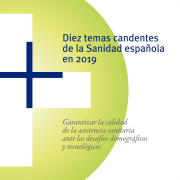7 days in healthcare (February 12th-18th, 2024)

Summary
From the point of view of Biomedicine, as is known, most rare diseases have no treatment, although this situation will surely be overcome in the not too distant future. A new drug (prozelimab) against the rare Chaple disease. A trial offers hope that a jab could prevent rheumatoid arthritis, the disease that affects 18 million people globally. Chances of a blood protein test warning about the onset of Alzheimer’s disease up to fifteen years in advance. A new powerful antibiotic (cresomycin), hope for antimicrobial resistance, which globally causes about five million deaths a year.
Regarding Global Health, despite the fact that 2021 marked the 100th anniversary of the appearance of insulin, many diabetes patients still do not have access to it. Important article in the New England Journal Medicine about e-cigarettes. There is sufficient evidence to show that switching from cigarettes to e-cigarettes reduces exposure to tobacco toxins, decreases respiratory symptoms, and reverses physiological changes related to cigarette smoking. There is not enough evidence that e-cigarettes are a good method to quit smoking.
In terms of International Health Policy, an unexpected consequence of the ruling of the United States Supreme Court, granting states the possibility of legislating on abortion, what was widely used to prohibit or restrict it: the taking of prescribed abortion pills by telemedicine and received by mail is a safe and effective method, according to a study. The European Commission approves the first gene editing treatment, in this case for beta thalassemia and sickle cell anemia. HERA (Health Emergency Preparedness and Response Authority) launches the Critical Medicines Alliance. It is said that this Alliance will contribute to changing the way medicines are produced and purchased in Europe.
If we talk about National Health Policy (Spain), there is great commotion in the sector as a result of the statements by Vice President Yolanda Díaz that she is negotiating to introduce in the budgets the modification of the health VAT from 0% to 21%. Regardless of the viability of this proposal, could it be considered whether this is the best way to make policy? Any study on the impact on the sector? Any previous negotiations with the health ecosystem? Although the Ministry of Health usually intervenes little in economic matters – remember that all the cuts during the financial crisis were not even discussed in the Interterritorial Council of the National Health System – this is a major issue that well deserves a position. and an analysis by the Ministry of Health. Asturias regulates financial compensation to professionals (442 euros for four hours of surgical activity and half for consultations for doctors) for extension of working hours to address the serious problem of waiting lists. Family doctors report a deficit of 2,600 professionals in the next year. As a consequence of the European Plan against Cancer, the launch of the first nine Comprehensive Cancer Centers in Spain is announced. The project is led in Spain by the Vall d’Hebron Hospital and the National Institute of Oncology.
As for Companies, on an international level, the British consulting firm Clarivate analyzes the 13 disruptive drugs for 2024. Oncology drugs predominate, although there is also the vaccine against respiratory syncytial virus and a new drug against COPD. At the national level, the growth of the egg freezing business in Spain is confirmed. It seems that the HIPRA vaccine is going to end up in the trash. There is nothing special, since failures are inherent to business, especially in an area as difficult as biotechnology. However, some excessively triumphalist government demonstrations could have been avoided.
Biomedicine
- The future of precision medicine in cancer. The possibilities of the drug screening method, referred to as functional precision medicine, in an article in Nature (https://www.nature.com/articles/d41586-024-00392-2)
- A new drug (pozelimab) for the rare CHAPLE disease. Globally there are 350 million individuals affected by rare diseases, representing approximately 8,000 diseases, of which around 80% have a genetic basis. Many rare diseases have no treatment, the so-called orphan diseases (https://www.thelancet.com/journals/lancet/article/PIIS0140-6736(23)02652-1/abstract#:~:text=Although%20the%20proof%20of%20concept,devastating%2C%20ultra%2Drare%20disease.)
- A trial offers hope that a jab can prevent rheumatoid arthritis. Rheumatoid arthritis affects about 18 million people globally. A clinical trial published in The Lancet shows that a drug used in rheumatoid arthritis, if injected, can slow the progression of the disease (https://www.theguardian.com/society/2024/feb/13/trial-offers-hope-for-millions-that-jab-could-prevent-rheumatoid-arthritis). Original article in The Lancet: https://www.thelancet.com/journals/lancet/article/PIIS0140-6736(23)02649-1/fulltext
- A blood protein test offers warning of Alzheimer’s 15 years in advance. A study by a Chinese and a British university shows that certain biomarkers can be detected in the blood, which predict the evolution towards Alzheimer’s up to 15 years in advance (https://www.ft.com/content/8b2ca925-96ae-46b0-9767-2bc1d3841f07). Original article in Nature: https://www.nature.com/articles/s43587-023-00565-0.epdf?sharing_token=2QUTT5LDC-9JarI5z2ZoPtRgN0jAjWel9jnR3ZoTv0O_pJhN3FnmSSYxU07iBAx9MbNFyMUVnm0eEKUl7TxhScrQnCwCMVKRFDcPwmrCmthgaDy7L22Qj4HVbHmET_OIemTl7GPyiuuKJJpbGCgEdGmwdmLAX3cQmzhSc7rw33MQ7IOpByh0U2B_a
- Powerful antibiotic relaunches the fight against resistant bacteria. The new antibiotic is called “cresomycin” and has shown good results in clinical trials in mice. Antimicrobial resistance, largely linked to the overuse of antibiotics, causes 5 million deaths a year, according to the WHO (https://www.ft.com/content/3fe32a51-823a-4b83-8c36-57065544b55d)
Global Health
- Who will put diabetes on the global health agenda? 2021 marks 100 years since the discovery of insulin. A century later, millions of people around the world live with diabetes and no or inadequate access to insulin (https://www.healthaffairs.org/content/forefront/finally-put-diabetes-global-health-agenda)
- Article in Science: The cure for HIV, the complex problem. Antiretroviral therapies do not prevent the maintenance of reservoirs (https://www.science.org/doi/10.1126/science.adk1831)
- NEJM article: Electronic cigarettes and smoking cessation. There is sufficient evidence to show that switching from cigarettes to e-cigarettes reduces exposure to tobacco toxins, decreases respiratory symptoms, and reverses physiological changes related to cigarette smoking. There is not enough evidence that e-cigarettes are a good method to quit smoking (https://www.nejm.org/doi/pdf/10.1056/NEJMe2314977)
- The many health needs of refugees in Chad (https://www.thelancet.com/journals/lancet/article/PIIS0140-6736(24)00306-4/abstract#:~:text=Malaria%2C%20acute%20respiratory%20infections%2C%20watery,the%20start%20of%20the%20emergency.)
- Health alert for the Alaska virus, this virus was identified for the first time in Fairbanks in 2015 (https://www.larazon.es/sociedad/alerta-sanitaria-virus-alaska-epidemia-que-dejado-varios-muertos -contagiados_2024021465cce43d344c980001c43ad2.html)
International health policy
- USA
- American agencies (Federal Trade Commission, FTC, and the Department of Health and Human Services, HHS) begin investigations into drug shortages (https://www.nytimes.com/2024/02/14/health/drug-shortages-ftc-hhs.html)
- More and more young people are using multiple psychiatric medications (https://www.nytimes.com/2024/02/16/health/adolescents-drugs-polypharmacy.html#:~:text=In%20this%20group%2C%20there%20was,for%20A.D.H.D.%20and%20anxiety%20drugs.)
- Taking abortion pills prescribed via telemedicine and received by mail is a safe and effective method, according to a study (https://www.nytimes.com/2024/02/15/health/abortion-pills-mail-safety.html#:~:text=Taking%20abortion%20pills%20prescribed%20through,a%20large%20new%20study%20found.)
- United Kingdom and the National Health Service
- Scotland raises the minimum price of alcohol from 50 p per unit to 65 p in an attempt to lower demand. Scotland was the first country in the world to introduce the average unit price of alcohol (https://www.bmj.com/content/384/bmj.q352)
- Dental plan for England criticized for failing to address systemic issues (https://www.bmj.com/content/384/bmj.q341)
- France
- Penuries of medicines, a bill wants to increase the stock obligations of industrialists and toughen sanctions (https://www.lemonde.fr/economie/article/2024/02/15/penuries-de-medicaments-une-proposition-de-loi-veut-augmenter-les-obligations-de-stock-des-industriels-et-durcir-les-sanctions_6216739_3234.html#:~:text=Actuellement%2C%20le%20montant%20de%20la,of%205%20m)
- Brazil
- Brazil begins to vaccinate against dengue in public health in the midst of the worst epidemic in 40 years (https://elpais.com/planeta-futuro/2024-02-17/brasil-empieza-a-vacunar-del-dengue-in-public-health-in-the-midst-the-worst-epidemic-in-40-years.html#)
- European Union
- The European Commission approves the first gene editing treatment with CRIPSR. The therapy called Casgevy is effective against beta thalassemia and sickle cell anemia (https://elpais.com/ciencia/2024-02-14/la-comision-europea-aprove-el-primer-tratamiento-de-edicion-genetics-with-crispr.html#)
- The ECDC predicts that measles cases will continue to increase in Europe (https://www.elmundo.es/ciencia-y-salud/salud/2024/02/16/65cf4b56fc6c8338438b457a.html#)
- The European Commission launches the Critical Medicines Alliance. Last week, the Health Emergency Preparedness and Response Authority (HERA) launched an open call for expressions of interest to join the Critical Medicines Alliance. It is said that the Alliance will contribute to changing the way medicines are produced and purchased in Europe (https://www.diariomedico.com/farmacia/profesion/ce-pone-marcha-alianza-medicamentos-criticos.html)
National health policy
- Announcements of changes to VAT in healthcare
- Yolanda Díaz wants to raise the VAT on health and education from 0% to 21%, a fiscal blow of 3,000 million. The statements are part of the negotiations on the general budgets with the Ministry of Finance (https://www.eleconomista.es/economia/noticias/12675210/02/24/diaz-prepara-un-golpe-de-mas-de-3000-millones-para-la-sanidad-y-la-educacion-privada.html)
- Medical cannabis
- The Ministry of Health initiates the process to regulate medicinal cannabis (https://elpais.com/sociedad/2024-02-14/sanidad-inicia-el-tramite-para-regular-el-cannabis-medicinal.html)
- Waiting lists
- Asturias regulates the remuneration of the so-called “peonadas” to address the waiting list. Up to 442 euros for four hours for surgical activity and 220 for consultations (https://www.lne.es/asturias/2024/02/16/442-euros-cuatro-horas-extra-98238532.html)
- Primary Care
- Family doctors estimate a deficit of 2,600 professionals in the next year (https://www.elmundo.es/ciencia-y-salud/salud/2024/02/13/65ca47a2e4d4d821598b4589.html)
- Impact on private hospitals of the possible closure of MUFACE
- The end of the MUFACE model would lead to the closure of private hospitals in 19 provinces (https://theobjective.com/sanidad/2024-02-12/fin-muface-cierre-hospitales-privados/)
- Comprehensive Cancer Centers
- First selection of 9 centers in Spain. This initiative responds to the EU Cancer Plan and consists of creating reference centers and comprehensive cancer care, which range from basic and applied research to specialized training. In Spain, this project will be led by the Vall d’Hebron Hospital and the Catalan Institute of Oncology (https://gacetamedica.com/opinion/enfoques-innovadores-en-oncologia-la-clave-de-los-comprehensive-cancer-centers-looking-for-europe/)
- Generality of Catalonia
- The Generalitat of Catalonia allocates 1.5 million to ensure that health workers speak Catalan (https://www.elindependiente.com/espana/2024/02/16/la-generalitat-destina-15-millones-a-garantizar- let-the-healthcare-speak-Catalan/)
Companies
- International News
- GSK’s respiratory syncytial virus vaccine becomes a bestseller in less than a year (https://www.elespanol.com/invertia/observatorios/sanidad/20240214/vacuna-virus-respiratorio-sincitial-gsk-convierte-best-seller-year/830667143_0.html#:~:text=The%20vaccine%20against%20the%20respiratory%20syncytial%20virus%20(RSV)%20of%20GSK,the%201,000%20mill)
- The thirteen disruptive drugs according to Clarivate. The star area is oncology, the gene therapy drug Vertex, the vaccine against respiratory syncytial virus and a new drug against COPD (chronic obstructive pulmonary disease) (https://www.diariomedico.com/farmacia/industria/trece-medications-will-change-therapeutic-paradigms.html). Access to the original document: https://clarivate.com/drugs-to-watch/
- J&J, Roche and Merck-MSD surpass Pfizer due to the drop in covid vaccines (https://www.expansion.com/empresas/industria/2024/02/17/65cfd07d468aeb96598b45c6.html#)
- National
- Vivanta changes its brand architecture and its parent company will be renamed Aestes (https://www.plantadoce.com/empresa/vivanta-cambia-su-arquitectura-de-marcas-y-su-matriz-pasara-a-llamarse-aestes#:~:text=PlantaTwelve-,Vivanta%20changes%20its%20architecture%20of%20brands%20and%20its%20parent%20willpass,the%20activity%20of%20the%20company.)
- Miura Partners sells Terrats Medical to Avista Capital for 270 million (https://www.plantadoce.com/empresa/miura-partners-vende-terrats-medical-a-avista-capital-por-270-millones#:~:text=270%20million%20%7C%20PlantaTwelve-,Miura%20Partners%20sells%20Terrats%20Medical%20a%20Avista%20Capital%20by%20270,implants%20dental%2C%20)
- Mesoestetic aims for revenues of 67.8 million euros in 2023, 6.7% more than the previous year (https://www.plantadoce.com/empresa/mesoestetic-apunta-ingresos-de-678-millones-de-euros-in-2023-a-67-more-than-the-previous-year#:~:text=year%20previous%20%7C%20PlantaTwelve-,Mesoestetic%20apoints%20income%20of%2067%2C8%20million%20of%20euros%20in,84%20million)
- The egg freezing business is skyrocketing in Spain (https://www.plantadoce.com/entorno/el-negocio-de-la-cambio-de-ovulos-se-dispara-en-espana-cuanto-dinero-move#:~:text=The%20demand%20for%20this%20treatment,%20experts%2C%20this%20figure%20willgrow.)
- The HIPRA vaccine ends up in the trash (https://www.abc.es/sociedad/vacuna-hipra-hito-covid19-costo-millones-acabara-20240218090847-nt.html?ref=https%3A%2F%2Fwww.abc.es%2Fsociedad%2Fvacuna-hipra-hito-covid19-costo-millones-acabara-20240218090847-nt.html)









